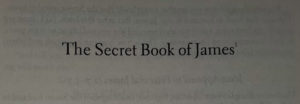It can be hard for those with different perspectives on religion and spirituality to be bold and direct. In the Secret Book of James, Jesus commands Peter and James to resist the temptation to shy away from conflict and keep their faith as a strictly internal matter. Let’s dive into a few passages from the text, using the Marvin Meyer’s translation found in the Nag Hammadi Scriptures.
How Dare You Be Apathetic?
In the Secret Book of James, Jesus reprimands James and Peter:
Do you still dare to listen when from the beginning you should have been speaking? Do you still dare to sleep when from the beginning you should have been awake so that heaven’s kingdom might receive you?
For Jesus, there may indeed be a time for listening, but this is not it. We must not go through our lives as those asleep, when we are called to being awake that the kingdom of God might receive us. We are challenged to not accept passivity or apathy, but to be bold and active as we engage with spirituality. This passage is immediately followed by:
I tell you the truth, it is easier for a holy person to sink into defilement and for an enlightened person to sink into darkness than for you to reign— or not to reign.
To reign is to commit; to not reign is to commit. Jesus here challenges James and Peter that it would be easier for them to become sinners or unenlightened (which should sound impossible for apostles such as these!) than it would be for them to be bold, as they are commanded to do. They– and thus we– stand condemned if they refuse to take a stand, make a commitment, and to live with their decision.
Interested in learning more? Click below to keep reading!
Continue reading “Jesus Commands: Be Bold (in the Secret Book of James)”

